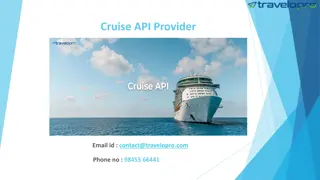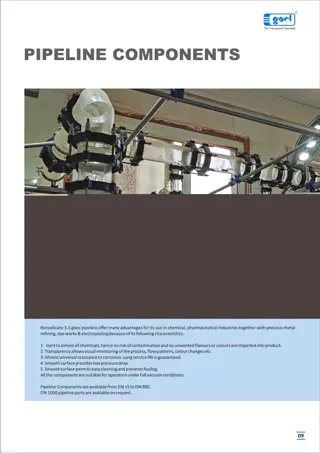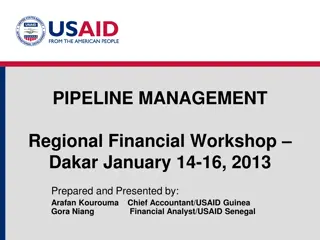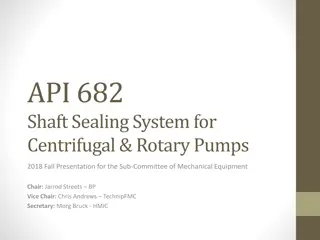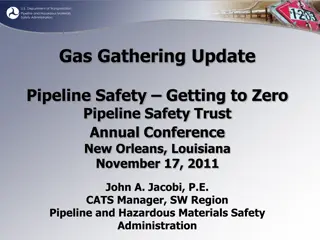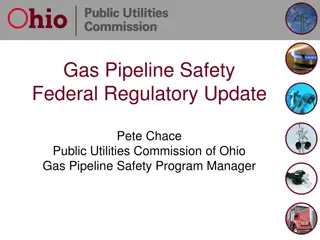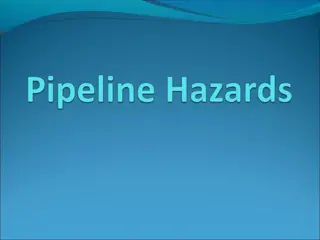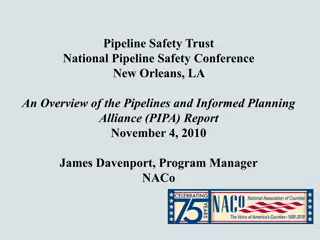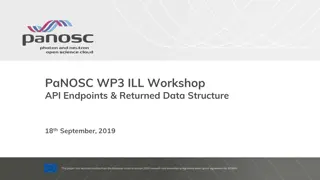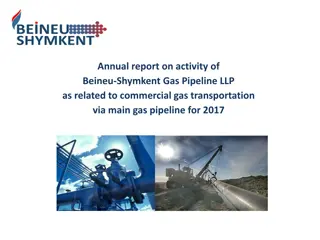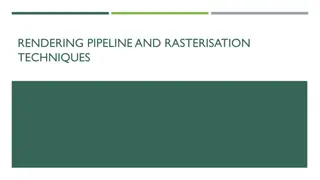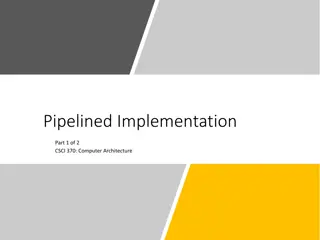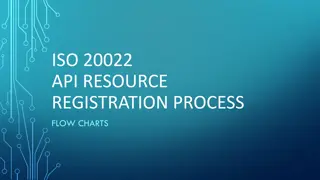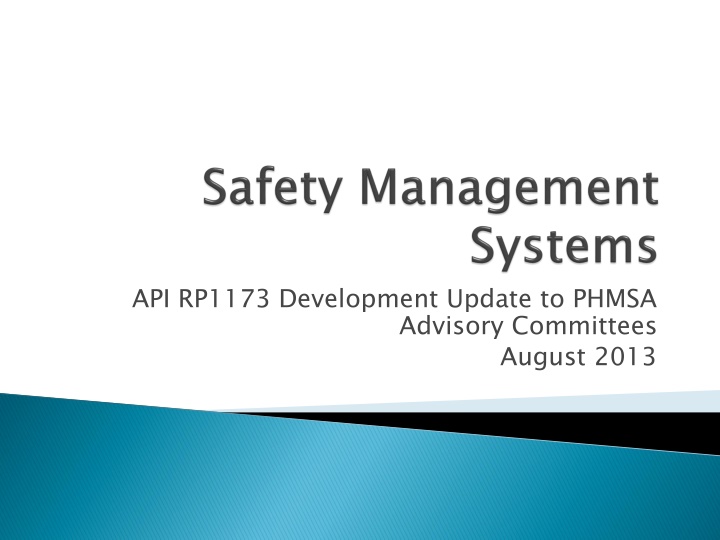
Developing API Recommended Practice for Pipeline Safety Management System
Pipeline safety stakeholders, led by the American Petroleum Institute (API), are collaborating to establish a comprehensive framework of recommended practices for pipeline safety and integrity procedures in the United States. The newly introduced API Recommended Practice 1173 focuses on how top management can enhance safety processes, ensure continuous improvement, and make compliance and risk reduction routine. The importance of Safety Management Systems (SMSs) in transportation systems is highlighted to proactively address safety issues, document procedures, treat errors as deficiencies, ensure senior management commitment to safety, identify responsible personnel, and establish non-punitive reporting methods for safety hazards.
Download Presentation

Please find below an Image/Link to download the presentation.
The content on the website is provided AS IS for your information and personal use only. It may not be sold, licensed, or shared on other websites without obtaining consent from the author. If you encounter any issues during the download, it is possible that the publisher has removed the file from their server.
You are allowed to download the files provided on this website for personal or commercial use, subject to the condition that they are used lawfully. All files are the property of their respective owners.
The content on the website is provided AS IS for your information and personal use only. It may not be sold, licensed, or shared on other websites without obtaining consent from the author.
E N D
Presentation Transcript
API RP1173 Development Update to PHMSA Advisory Committees August 2013
Pipeline safety stakeholders led by the American Petroleum Institute (API) are working to develop a comprehensive framework of recommended practices for pipeline safety and integrity procedures across the United States. Result: New API Recommended Practice 1173 Pipeline Safety Management System specific to pipeline operators across the United States Key components of RP 1173: How top management develops processes to reveal and mitigate safety threats Provide for continuous improvement Make compliance and risk reduction routine.
The pipeline industry (both natural gas and hazardous liquids) has previously considered Safety Management Systems to assure that adequate processes exist to protect the public, the environment, employees and contractors. Many pipeline operators have highly evolved management systems but lack of industry guidance may cause gaps between operators and ranges of quality and comprehensiveness.
Pipeline incidents in 2010 and 2011 revealed management system weaknesses as contributing factors. The NTSB Marshall, MI incident report stated: Evidence from this accident and from the San Bruno accident indicates that company oversight of pipeline control center management and operator performance was deficient. The agency found that a Pipeline Safety Management System would improve performance through top management leadership.
Implementation of SMSs in transportation systems by elevating SMSs to its Most Wanted List. SMSs continuously identify, address, and monitor threats to the safety of company operations by doing the following: Proactively address safety issues before they become incidents/accidents. Document safety procedures and requiring strict adherence to the procedures by safety personnel. Treat operator errors as system deficiencies and not as reasons to punish and intimidate operators. Require senior company management to commit to operational safety. Identify personnel responsible for safety initiatives and oversight. Implement a nonpunitive method for employees to report safety hazards. Continuously identify and address risks in all safety-critical aspects of operations. Provide safety assurance by regularly evaluating (or auditing) operations to identify and address risks.
Ron McClain, Kinder Morgan Energy Partners, Chair Mark Hereth, P Scott Collier, Buckeye Partners Tom Jensen , Explorer Pipeline Paul Eberth, Enbridge Pipelines Brianne Metzger Tracey Scott, Alliance Pipeline William Moody, Southwest Gas Nick Stavropoulos, Pacific Gas and Electric Steve Prue, Small Gas Distribution To Be Named, Public John Bresland, Public Stacey Gerard, Public Jeff Wiese, PHMSA Linda Daugherty, PHMSA (alternate) Edmund Baniak, API (Standards Support) Robert Miller, AZ Corporation Commission Massoud Tahamtani, VA State Corporation Commission Bob Beaton, NTSB (Ex Officio) Kate Miller, AGA Scott Currier, INGAA Peter Lidiak, API Ron McClain, Kinder Morgan Energy Partners, Chair Mark Hereth, P- -PIC, Content Editor Scott Collier, Buckeye Partners Tom Jensen , Explorer Pipeline Paul Eberth, Enbridge Pipelines Brianne Metzger- -Doran, Spectra Energy Tracey Scott, Alliance Pipeline William Moody, Southwest Gas Nick Stavropoulos, Pacific Gas and Electric Steve Prue, Small Gas Distribution To Be Named, Public Subject Matter Expert John Bresland, Public Subject Matter Expert Stacey Gerard, Public Subject Matter Expert Jeff Wiese, PHMSA Linda Daugherty, PHMSA (alternate) Edmund Baniak, API (Standards Support) Robert Miller, AZ Corporation Commission Massoud Tahamtani, VA State Corporation Commission Bob Beaton, NTSB (Ex Officio) Kate Miller, AGA Scott Currier, INGAA Peter Lidiak, API PIC, Content Editor Direct Participants 4 Liquids Pipelines 4 Natural Gas Pipelines 1 City Distribution 3 Trade Organizations 3 Regulators 1 NTSB 3 Public SME s 1 Contract Engineering 1 Standards Organization Doran, Spectra Energy Subject Matter Expert Subject Matter Expert Subject Matter Expert * Plus alternates
Management Commitment and Leadership Risk Management Operational Controls Incident Investigation, Evaluation and Lessons Learned Safety Assurance and Continuous Improvement Competence, Training, Qualification and Development Emergency Preparedness and Response Documentation and Record Keeping Stakeholder Engagement
Since continuous improvement implies that SMS is more of a journey than an event, there must be ways to measure progress. Evolution might include: Minimal Compliance Lack of Management Involvement Commitment to Compliance Rules and Procedures SMS in Place Individuals seeking risk reduction SMS Evolving Teams Continuously Improving Greatly Reduced Incident Rates and other Metrics
The SMS Development Team Recognizes the need to ramp up external communications. Two subteams were identified to: Develop an external communications plan for interested parties. John Stoody of AOPL will lead this team. Directly engage external Subject Matter Experts (especially those who have developed other SMS Processes) for review and input. Brianne Metzger-Doran of Spectra Energy will lead this effort. 1. 2.
API intends to further develop RP 1173 by identifying and addressing safety issues in a pipeline s lifecycle, including the design, construction, operation, maintenance, integrity management and abandonment of pipelines at the earliest stage to prevent conditions that may ultimately result in an incident. API is confident it can create an SMS that enhances pipeline safety in a practical way while implementing guidelines for continuous improvement. Once the stakeholder group develops draft pipeline SMS, the organization will hold a public comment period to seek input and feedback on the guidelines outlined in RP 1173. All comments will be addressed but not necessarily incorporated into the document as ANSI requires. After the comment period, API members will vote whether to accept or reject the document as a recommended practice applicable to all pipeline operators.
NTSB Report Marshall, MI July 10, 2012 API Workshop on Management Systems October 4, 2012 Initial Meeting of SMS Development Team Members December 18, 2012 Time to conclude: 18 months to allow for development, drafts for comments, final version, API Balloting August 2013 4th Internal Draft RP 1173 Review External Review and Comment Process TBD Potential Publication 2nd half of 2014


